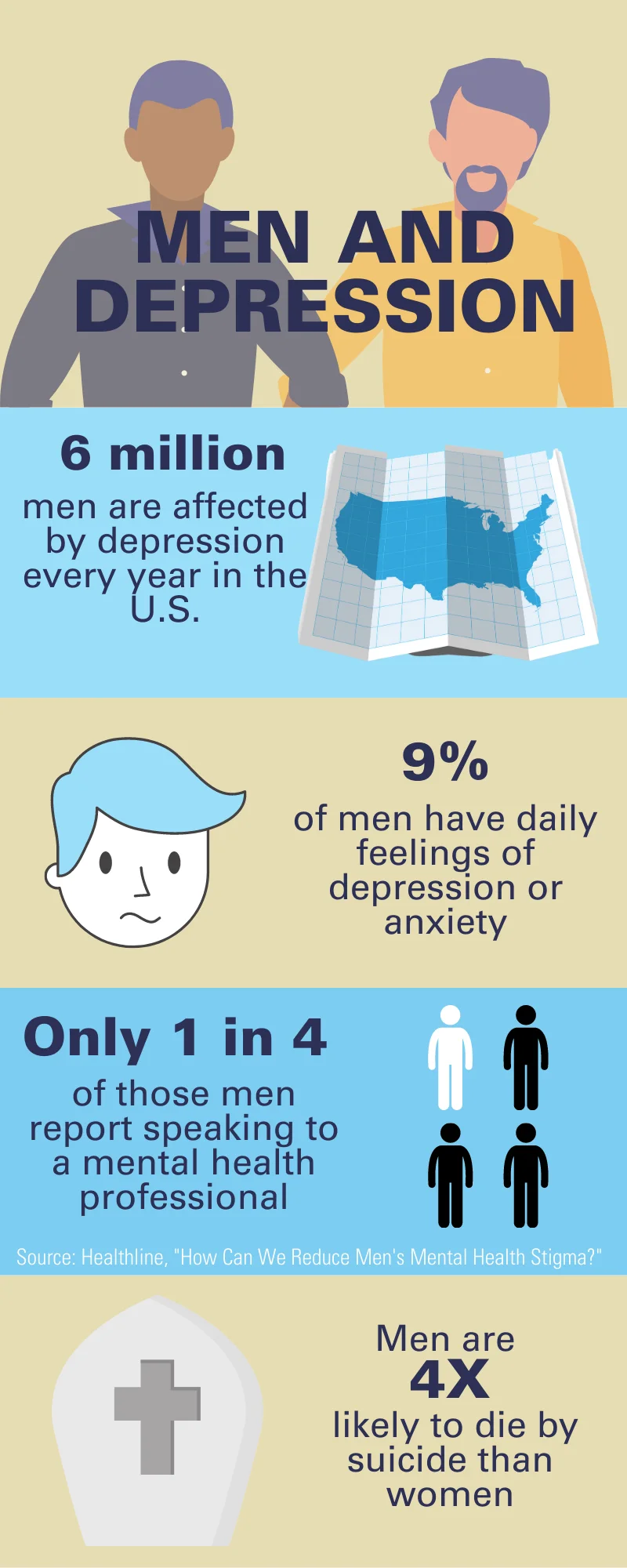
Real Men Go To Therapy: Know The Signs Of Depression In Men
James LaCorte via Blue Cross NC
Growing up I saw men in my family struggle with real emotions and avoid most deep conversations. I partly blame this on my Italian heritage, where men are expected to work hard, avoid feelings and push through pain. In my family, a man’s role was to provide and protect the family at all costs. If you showed any sign of weakness, that meant you were not in control.
As a kid I straddled two worlds: one trying to be the man that I thought was expected of me, and the other wanting to be able to express my feelings. I was an emotional kid, and I know it was hard for my dad to relate to me.
My emotions were all over the place:
Feelings of guilt, worthlessness, and helplessness
Pessimism and hopelessness
Consistently tired
Irritability
Loneliness
I knew something was wrong, but I was afraid and unable to express it. How could I, since this sort of thing was not talked about, and I did not even know what depression was?
Years into my marriage, my anger and sadness were unbearable, and I made myself and my family miserable. It took my wife demanding that I go to therapy for me to put my fears aside and go. I was afraid of appearing weak, finding something wrong with me, or being put on medication. I was afraid to face my pain, because I thought real men did not go to therapy. I had a good life and felt stupid for being sad.
Depression does not discriminate.
Mental illness can affect anyone. It doesn’t matter your age, gender, race or ethnicity, living situation or social status. And depression is nothing to be ashamed of. It’s a medical problem, just like heart disease or diabetes. You’re not alone.
Well, let me tell you, real men go to therapy. The work my therapist and I did together may have saved my life and my marriage. It’s not easy. It takes a while to explore and find solutions to heal. To this day, I struggle with depression. And while I do not go to therapy on a regular basis anymore, I am comfortable identifying when I need to go again and know how to talk about it with my wife.
Therapy gave me a fresh perspective. It provided me with the tools to identify warning signs and figure out how to address them before getting more depressed. It’s not magic, but it limits the spiral of self-pity, and knowing I can talk to a professional at any time helps. I feel more secure overall and now realize a lot of people struggle with depression, but it’s only recently we’ve started talking openly about it.
Here’s how to find support.
If you are member of Blue Cross and Blue Shield of North Carolina, you can use our Find a Doctor tool to identify a therapist. Even if you aren’t a member, this tool can help you find qualified therapists in your part of the state.
Many therapists offer virtual visits, so it eliminates traveling and any fears about going into an office.
If you have a primary care doctor you trust, you can also talk to them for help finding a therapist who’s right for you.
To learn more about mental health benefits your plan offers, call the number on the back of your card, and someone from customer service can help you connect with a mental health provider. You can also visit our member website on behavioral health to learn more about ways to get support.
Whatever you’re going through, there’s a good chance therapy can help you like it’s helped me.
SEE ALSO: Tips For Taking Care Of Your Mental Health, How To Find A Therapist If You’ve Never Had One Before
Men and Depression: Statistics

SEE ALSO: When Pandemic Blues & Seasonal Depression Collide
________________________________________________________________________
Interested in learning more about health coverage? The agent on this webpage can help at no cost to you!
